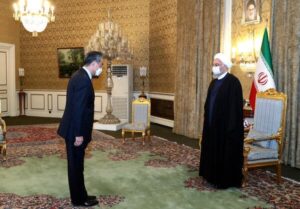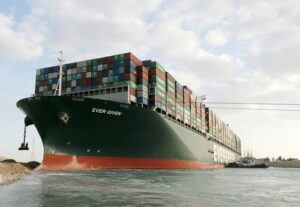
The National Interest Foundation Newsletter
Issue 90, April 1, 2021
Welcome to our NIF Newsletter. In this week’s headlines: global outrage regarding the Myanmar military junta’s brutal crackdown grows following the deadliest round of violence yet on the country’s Armed Forces Day, Eritrea agrees to withdraw forces from Tigray amid international concern over serious human rights violations and war crimes being committed during the ongoing conflict there, Iran and China sign a 25-year cooperation agreement in an effort to strengthen their economic and political alliance, and movement through the Suez Canal resumes after the refloating of the wedged ‘Ever Given’ ship but with significant time expected to clear the backlog and trade market disruptions caused by the incident.
Global Outrage at the Myanmar Junta Grows

Around the world, outrage has risen regarding the Myanmar military junta’s continued ruthless crackdown against its own citizens. (Photo from AP)
Global Outrage Towards the Myanmar Junta’s Brutal Crackdown Grows Following Deadly Violence on the Country’s Armed Forces Day
Myanmar’s military junta marked the country’s Armed Forces Day by ruthlessly cracking down on peaceful protesters in the streets of major cities. The military of Myanmar, called the Tatmadaw, hosted a parade in the capital city of Naypyidaw to celebrate their so-called accomplishments in the last year, including the coup that ousted democratically-elected leader Aung San Suu Kyi. The Tatmadaw warned demonstrators that planned to protest on the military holiday that they risked being “shot in the head or back.” Despite this, hundreds of pro-democracy and anti-coup demonstrators flocked to the streets in Naypyidaw, Yangon, and elsewhere in what proved to be the bloodiest day since the coup took place back in early February. More than 100 protesters were murdered, bringing the death toll of civilians killed by the military to over 500 people in the aftermath of the Tatmadaw seizing power.
Human Rights Violations in Tigray

Both Eritrean and Ethiopian soldiers have been accused of engaging in grave human rights violations against local civilians in Tigray. (Photo from Getty Images)
International Concern Over Serious Human Rights Violations and War Crimes Being Committed During the Ongoing Tigray Conflict
Eritrea has agreed to withdraw forces from Tigray amid international concern about serious human rights violations and war crimes being committed during the ongoing conflict there. Scores of local civilians in Ethiopia’s Tigray region have accused Eritrean soldiers of indiscriminately killing unarmed civilians, looting, and engaging in other major abuses – with some Ethiopian troops not free from allegations of improper behavior as well. International rights groups have verified the credibility of the accounts and therefore urged for the immediate withdrawal of foreign forces as a first step, in addition to an independent investigation into the matter. Recently, U.S. officials have also expressed increased alarm and echoed the calls for an Eritrean troop withdrawal to help alleviate the dire humanitarian crisis. Over the course of the past several months, civilians in Tigray have suffered the most because of the violence, as thousands of people have died and hundreds of thousands more have been displaced from their homes.
Iran-China Cooperation Agreement

Analysts and issue experts have highlighted how Beijing is seeking to expand its influence in the region with the signing of the agreement. (Photo from AP)
Iran and China Sign a 25-Year Cooperation Agreement in an Effort to Strengthen Their Economic and Political Alliance
This week, China and Iran announced the signing of a massive bilateral trade and cooperation deal between the ruling regimes in the two countries, in an effort to strengthen their economic and political alliance. Among other things, the agreement calls for China to heavily invest a total of $400 billion in Iran over a 25-year period. Dozens of Iranian sectors are set to see a windfall from this, including banking, infrastructure, health care, and information technology. In exchange, Iran will provide China with a regular supply of oil at a markdown price. The deal also calls for increased military cooperation, joint research, and intelligence sharing. Negotiations over the agreement have been taking place since 2016, when Chinese President Xi Jinping first broached the subject. In recent years, China has been seeking to expand its influence in the Middle East and offer an alternative to the American presence in the region. The agreement with Iran is the most serious example to date of this.
Suez Canal Blockage

A small group of boats worked around the clock to free the stuck container ship. (Photo from Suez Canal Authority)
Movement Through the Suez Canal Resumes but with Significant Time Expected to Clear the Trade Market Disruptions Caused by the Incident
Movement through the Suez Canal resumed after the refloating of the wedged ‘Ever Given’ ship but with significant time expected to clear the backlog and trade market disruptions caused by the incident. After a week of stalemate, the ship blocking the canal was freed, and one of the world’s busiest maritime routes is open once more. However, the economic complications from the ‘Ever Given’ becoming lodged in the canal are likely to be felt in the coming weeks and months. Estimates cite that 12% of the world’s trade passes through the Suez Canal each day, in addition to a million barrels of oil and natural gas. As a result of the ‘Ever Given’ being stuck for nearly a week, oil and gas shortages are expected, as well as delays of consumer products. The crisis is of particular concern to Egypt, which takes in roughly $14 million in revenue from the canal on a daily basis. Trade passing through the Suez Canal encompasses roughly 2% of Egypt’s total annual GDP, and reports have surfaced that indicate the country is considering seeking compensation for the blockage caused by the ‘Ever Given.’
